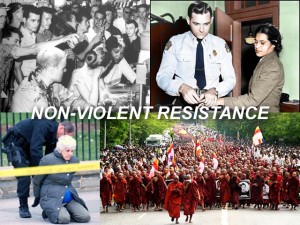 I recently had an email exchange with a reader of this blog about pacifism and nonviolence. Usually such exchanges are better suited for the comment section of blog posts, since this allows more people to weigh in on the conversation. So, for the sake of inviting you in to the conversation, I will post our email exchange below. Please read it and then weigh in with your own thoughts.
I recently had an email exchange with a reader of this blog about pacifism and nonviolence. Usually such exchanges are better suited for the comment section of blog posts, since this allows more people to weigh in on the conversation. So, for the sake of inviting you in to the conversation, I will post our email exchange below. Please read it and then weigh in with your own thoughts.
I am interspersing my thoughts into the exchange (indicated by brackets [ … ]), and will conclude with some brief observations and clarifications.
Derek (not his real name): A question. If it is the job of the Holy Spirit to convince the world of sin (and I agree that this is the job of the Holy Spirit) are you saying that we as a nation are not to do anything about the threat to our freedom from ISIS or the other radical Muslims who say we must submit to their god? “A nation” is composed of people (some of the population being Christian) and if they do nothing against their enemies, then they will be over run by those enemies. Would just like a little clarification. Otherwise, you are correct that we should not use the “Christians are not perfect…just forgiven” as an excuse for covering for someone who has done wrong who claims to be a Christian. Of course, I assume you do believe that Christians are not perfect until God gives us our glorified body. Right or do you believe Christians can become perfect?
J. Myers: No, I am not saying that we should do nothing about ISIS. But violence will only lead to more violence. There are ways to nonviolently resist the things they are doing. Think Gandhi, Martin Luther King Jr., Nelson Mandela, etc.
[I didn’t answer his questions about Christian perfectionism. I do not believe Christians can become perfect in this life, but I didn’t want our discussion to get sidetracked onto peripheral issues.]
Derek: Please tell me one way you can nonviolently resist the radical ISIS? While nonviolence is a desired way, you approach a radical ISIS member and you most likely will lose your head.
Will be waiting your reply, as I have much to say about Gandhi, Martin Luther King Jr., and Nelson Mandela.
J. Myers: There is no “one way” or even “a way” that fits every situation. That is why creativity and determination are needed in nonviolent resistance.
But no, I would never recommend approaching a radical ISIS member. Why would you? Nonviolent resistance is primarily for the times when they approach you. And yes, you might lose your head. But Jesus was crucified, and in God’s economy, dying for what is right is more of a “win” than killing someone else to save one’s life.
[Note that nonviolent resistance is not about “winning” or “defeating the enemy.” If we nonviolently resist, we may end up dead. That’s what happened to Jesus, after all. The goal of nonviolent resistance is not to “stay alive” while taking the life of someone else (if necessary), but it is rather to reveal God and love others like Jesus. It is impossible to do this if you are killing them.]
Derek: It is good that most Christians in the United States – from the beginning of the republic until today – do not hold your pacifistic viewpoints on dealing with the devils who call themselves Islamic Jihadists.
[Note the scapegoating going on in Derek’s statement. He has “de-humanized” these Muslims by calling them “devils.” We get very upset when Muslims refer to the United States as “The Great Satan,” but we do the same thing to them.]
I don’t know exactly what you mean by, “That is why creativity and determination are needed in nonviolent resistance.” I will admit, that if a person can meet one of these people who is not so radicalized, and you can tell him or her about the saving Grace of God, and that their Allah is not the real God, it is possible to win them to Christ. But how many of them are going to give you that opportunity? Not many.
[Yes. If the first words out of your mouth when you meet a Muslim include “Allah is not a real God,” it is not surprising that they will not want to hear the rest of what you have to say, and you will not “win them to Christ.” But who ever said that such words need to be included in the first conversation you have with Muslims? Or even the tenth? Or Hundredth?]
I believe that God is allowing these radical Muslims and other revolutionaries to stir up the middle east – perhaps bringing about World War III – so the people of the world who are so naïve, will fall for the argument that we need a World Government perhaps under the current United Nations. I believe we are in the Last Days, and if such does come about, from this World Government could come the Anti-Christ which the Scriptures tell us about. If that happens, then you should know the rest of the story.
[Here is the scapegoating again. World War III is already being blamed on the Muslims, and it hasn’t even started yet!]
Earlier, you had mentioned the “nonviolent” tactics of Gandhi, Martin Luther King, and Nelson Mandela.
Gandhi was a true believer and practitioner of “nonviolence.” However, my understanding is that he was not a “born again” Christian, despite all the good work he did. If the Scriptures are correct in their teachings (and I believe they are), then Gandhi is in torment in Hell as I write this email.
[Isn’t it strange that while Gandhi can better follow the instructions of Jesus than most Christians (even though He was Hindu), he is “in torment in Hell” right now? Yes, I know we do not receive eternal life by works, but I find this entire line of reasoning quite shocking. Also, because Gandhi wasn’t a “Christian” he apparently has nothing to teach us?]
Martin Luther King attended various meetings which were sponsored by organizations which were “communistic” in nature. While his nonviolent protests did bring about the Civil Rights movement and led to ending the wrongs of Segregation, one of the unintended consequences of such has produced Black hoodlums across America, many of whom have the idea they do not have to obey the laws of the land because their ancestors were slaves. Racial tensions are greater today, than they were during the days of Segregation. Martin Luther King was a professing Christian and Minister, and I have to give him the benefit of the doubt that at some time in his life, he trusted in the shed Blood of Christ on the Cross for forgiveness of his sins, and held to that trust for his Salvation until the day he was assassinated.
[So, Martin Luther King Jr., though he was a Christian and a pastor, can apparently be discredited too because his meetings were sponsored by communistic organizations? And what is this about the end of segregation being responsible for “black hoodlums across America”? Yikes!]
Nelson Mandela was another who was influenced by “communistic” doctrines. And while he may have been unjustifiably held in prison for many years, I do not believe he was a professing Christian, and if he was not, then we can only know what the Scriptures teach us. Despite his bringing an end to Apartheid, I understand that South Africa is as unsafe to travel to today as are some areas of New York City.
[And Mandela was a communist too, and therefore, cannot be trusted? And the end of Apartheid is responsible for violence in South Africa and even New York… ]
Nonviolence works only when your enemy agrees to become nonviolent. Nonviolence did not win us the Revolutionary War. Nonviolence did not win the Civil War for the restoration of the Union. Nonviolence did not win us World War I, and Nonviolence did not win us World War II. However, pacifism did influence our loss of some 55,000 American Soldiers in the Korean Conflict, and some 60,000 plus in the Viet-Nam War.
[Here is the whole concept of “winning” again. And the confusion of nonviolent resistance with pacifism.]
God commanded Israel to go to war against their enemies many times in the Old Testament. And while I prefer peace over war, and I wish “nonviolence” was the doctrine of all nations and tribes, there are times when a nation has to go to war to assure its citizens of security from those who will harm us. Anything less will ensure oppression and occupation from those who would kill us and destroy the way of life we have been blessed with.
[And the best trump-card of all – the violent portrayals of God in the Old Testament.]
J. Myers: I am not a pacifist. I have never claimed to be a pacifist. I do not recommend that anybody become a pacifist. Nonviolent resistance is not at all the same thing as pacifism. On the spectrum of forms of resistance, just-war is closer to pacifism than to nonviolent resistance.
Based on your comments, I see we disagree on many, many things. That’s fine. But many of those disagreements are forming the foundation for our disagreement on this issue. This means that any further debate on this issue will be a waste of time for both of us.
Derek: “Nonviolent resistance is not at all the same thing as pacifism.”
Don’t know what planet you have just arrived from, but “Nonviolence” and “Pacifism” are the same thing. Neither are willing to take up arms to fight a threatening enemy. Don’t know how old your are, but I will be 71 at the end of this month of June. I taught American History for some 10 years at a community college. I have studied history most of my adult life. One thing I have learned from my studies, is that you cannot allow an enemy to exist. He has to be destroyed, or he will destroy you. History teaches that, and reality proves such. Both Pacifists and Nonviolence advocates refuse to admit to such.
I did not respond any further, since I saw the exchange was becoming “unproductive.”
Here are some closing thoughts:
Nonviolent resistance is primarily differentiated from pacifism by the word “resistance.” Pacifists often are content to sit back, do nothing, and let evil roll over them. They see their role in resisting evil as little more than a speed bump. They might slow down evil as it rolls over them, but they are probably not going to stop it.
Nonviolent resistance, on the other hand, is actively devoted to resisting evil and injustice in every way possible, yet without resorting to violence. There is, as you can see, a huge difference between the two.
 The Bible does not promote pacifism, but does promote nonviolent resistance. We are to do what we can to stop evil and fight against evil, but we must not do so with the weapons of war and violence. Among many other texts, one primary place Jesus teaches this is in His instruction to love our enemies.
The Bible does not promote pacifism, but does promote nonviolent resistance. We are to do what we can to stop evil and fight against evil, but we must not do so with the weapons of war and violence. Among many other texts, one primary place Jesus teaches this is in His instruction to love our enemies.
There are six elements to nonviolent resistance, which differentiates it from pacifism and they are summed up well by Martin Luther King Jr. (King, Stride Toward Freedom, 1958, 84-88)
First, one can resist evil without resorting to violence.
Second, nonviolence seeks to win the “friendship and understanding” of the opponent, not to humiliate him.
Third, evil itself, not the people committing evil acts, should be opposed.
Fourth, those committed to nonviolence must be willing to suffer without retaliation as suffering itself can be redemptive.
Fifth, nonviolent resistance avoids “external physical violence” and “internal violence of spirit” as well: “The nonviolent resister not only refuses to shoot his opponent but he also refuses to hate him.” The resister should be motivated by love in the sense of the Greek word agape.
The sixth principle is that the nonviolent resister must have a “deep faith in the future,” stemming from the conviction that “the universe is on the side of justice.”
Near the end of our email exchange, Derek listed several wars that had been “won” by the use of violence. The definition of “winning” is somewhat debatable. While one country might have forced another country to “lie down,” was the cost of human life on both sides “worth it”? Is this “winning”?
He points out that pacifism caused the death of thousands. I do not deny it.
But note carefully that I am not defending or recommending pacifism. I am recommending active nonviolent resistance.
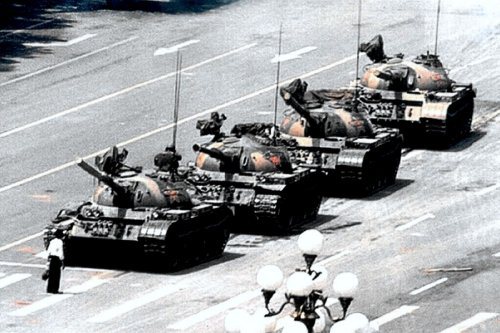
What is most surprising about nonviolent resistance is that where it has been used in human history, it has a better “success” record than does violent resistance (or war).
In one chapter of his book, Engaging the Powers (which is a book every Christian should read), Walter Wink lays out the history of nonviolent resistance and shows how when it is properly used, nonviolent resistance is more successful than war at stopping evil and violence. In fact, in many cases where violence was completely and repeatedly unsuccessful, nonviolent resistance brought about the change that violence had attempted to accomplish, but failed.
In a TED talk a few years ago, political scientist Erica Chenoweth talked about her research comparing nonviolent and violent campaigns, and she said that while she used to believe that violent resistance was more successful than nonviolent resistance, the data she collected blew her away and changed her mind forever. She said, “I collected data on all major nonviolent and violent campaigns for the overthrow of a government or a territorial liberation since 1900,” she says — hundreds of cases. “The data blew me away.” Below are some charts of her research, and you can read more about it here.
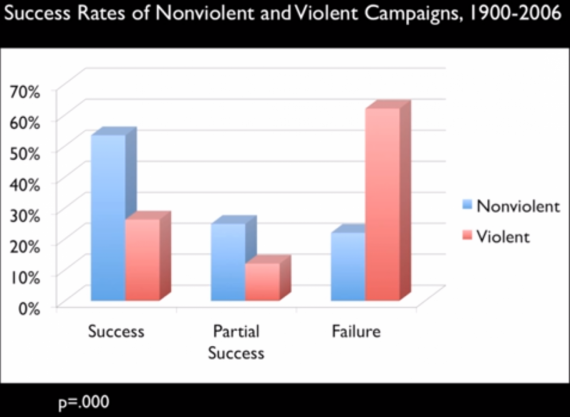
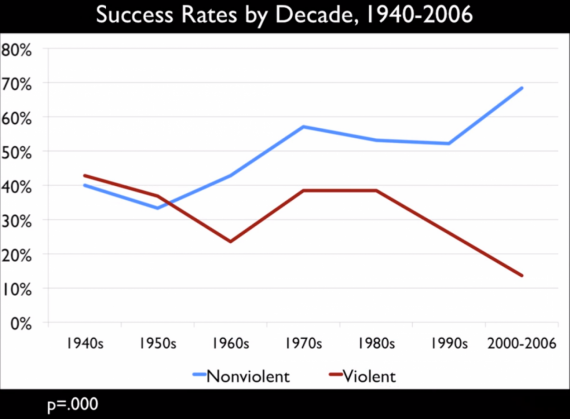
You can watch her TED talk here:
There is so much to be said about nonviolent resistance, but I’ve said enough for now, and the only real point of this post was to invite you into the conversation I had with Derek. Where was I wrong? Where was he?
What could have (and should have) been clarified? What is your perspective on nonviolent resistance, pacifism, and war?
Leave your comments below!






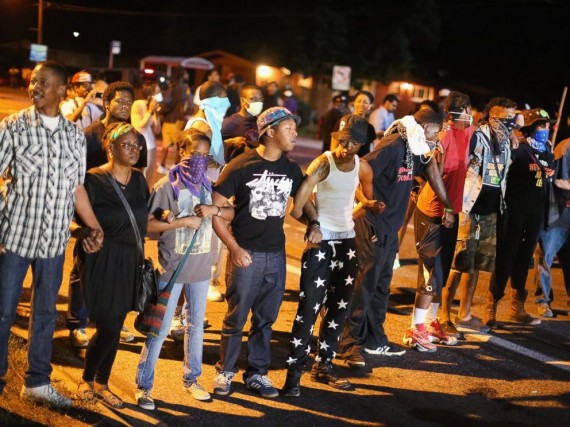
 And again, maybe the Grand Jury will uncover some evidence which proves that Darren Wilson was racist, and if so, such actions and behavior can be rightly condemned by those who follow Jesus.
And again, maybe the Grand Jury will uncover some evidence which proves that Darren Wilson was racist, and if so, such actions and behavior can be rightly condemned by those who follow Jesus.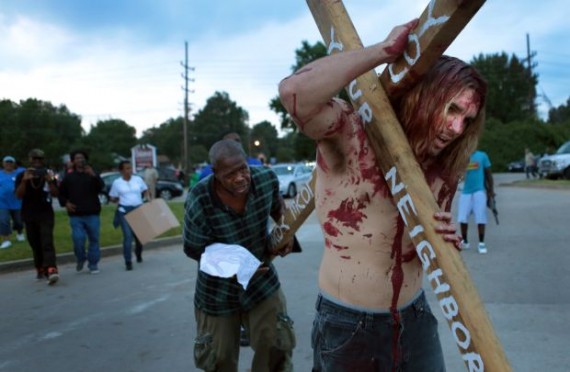


 This is important because of the third principle of non-violent resistance, which is that we are not seeking to defeat people but to defeat injustice. Non-violence recognizes that those who perpetrate violence are victims of violence as well.
This is important because of the third principle of non-violent resistance, which is that we are not seeking to defeat people but to defeat injustice. Non-violence recognizes that those who perpetrate violence are victims of violence as well.

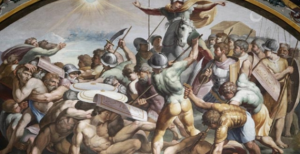 And yet, there is a deep truth here we must not miss. I ended the
And yet, there is a deep truth here we must not miss. I ended the  Though we may not always understand why and how sin and suffering enters into God’s world, one thing we can know through the crucifixion of Jesus is that God does not send sin and suffering, but rather, is a victim of it along with us.
Though we may not always understand why and how sin and suffering enters into God’s world, one thing we can know through the crucifixion of Jesus is that God does not send sin and suffering, but rather, is a victim of it along with us. 